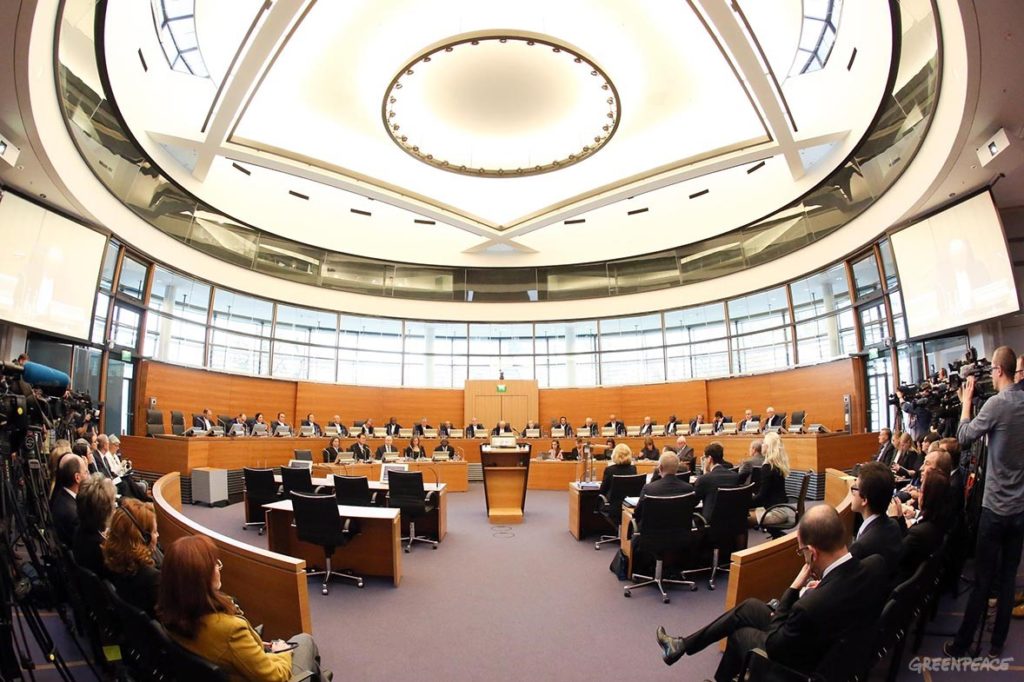Beijing’s South China Sea Claims Have No “Legal Basis” Rules Tribunal

The Hague, 07 Syawal 1437/13 July 2016 (MINA) – China’s claim to a large swathe of the South China Sea was refuted Tuesday by an international tribunal, in a case brought by the Philippines about contested islets in the resource-rich area.
“The tribunal concluded that there was no legal basis for China to claim historic rights to resources within the sea areas falling within the ‘nine-dash line’,” it said, a reference to the conventional demarcation of the claimed zone on Chinese maps.
China dismissed the ruling, saying it was “null and void and has no binding force,” the Foreign Ministry said.
“China has sovereignty over Nanhai Zhudao,” the government said, using a Chinese term that refers to all the islands in the part of the South China Sea it claims.
Chinese President Xi Jinping went even further, saying Beijing “will not accept any proposition or action” based on an international court’s ruling against China’s claims in the disputed South China Sea.
Xi said South China Sea islands have been China’s territory since ancient times and the country’s territorial sovereignty would not be affected by the ruling, the official Xinhua news agency reported.
The president, who was speaking on the first day of an annual summit between China and the European Union, said Beijing is “firmly committed to peace and stability in the South China Sea, and to settling the disputes with countries directly involved through peaceful negotiations.”
However, unlike the Foreign Ministry, he did not criticize the Philippines for bringing the case to the Arbitral Tribunal of the Permanent Court of Arbitration in The Hague.
Reefs cannot generate maritime zones
The disputed islets includes ones known as Nansha Qundao, which the Philippines claims part of under the name of the Spratly Islands.
The tribunal concluded that the Spratlys were not islands, rather reefs, and “cannot generate maritime zones,” or extend China’s territorial claims as maintained by Beijing.
The United States welcomed the decision. State Department spokesman John Kirby said in a statement that the decision “should serve as a new opportunity to renew efforts to address maritime disputes peacefully.”
Speaking later Tuesday at a briefing in Washington, he said the decision was legally binding and the world expects China to fulfill its obligation.
“The world is watching to see if China is really the global power that it professes to be,” Kirby said.
The Philippines welcomed the “milestone decision,” but called for “restraint and sobriety,” Foreign Secretary Perfecto Yasay said.
“Our experts are studying the award with the care and thoroughness that this significant arbitral outcome deserves,” he said. “In the meantime, we call on all those concerned to exercise restraint and sobriety. ”
He added that the Philippines strongly affirmed its respect for the decision “as an important contribution to ongoing efforts in addressing disputes in the South China Sea.”
Manila filed the case in January 2013 after China took control of Scarborough Shoal, 124 nautical miles from the Philippines’ north-western coast.
The tribunal also ruled that China’s actions at Scarborough “violated the Philippines’ sovereign rights in its exclusive economic zone” by interfering with fishing and petroleum exploration conducted by Filipinos and constructing artificial islands.
Rejections by other claimants
Apart from China and the Philippines, Brunei, Malaysia, Taiwan, and Vietnam also have overlapping claims to the South China Sea, a key shipping lane believed to be rich in both mineral and marine resources.
Taiwan, which occupies one of the islands affected by the ruling, Taiping Island or Itu Aba, also rejected the decision, which it said damages it rights in the South China Sea.
“We firmly reject the decision. The ruling does not legally bind Taiwan at all,” presidential office spokesman Alex Huang said.
Taiwan was not invited to take part in the arbitration and was never consulted, Huang said.
Vietnam, which initially expressed interest in joining the Philippines’ case, reaffirmed its claims to parts of the South China Sea that overlaps with Manila and Beijing’s.
“Vietnam strongly supports that disputes in the South China Sea should be resolved through peaceful measures,” Foreign Ministry spokesman Le Hai Binh said in a statement. (T/R07/R01)
Mi’raj Islami News Agency (MINA)



